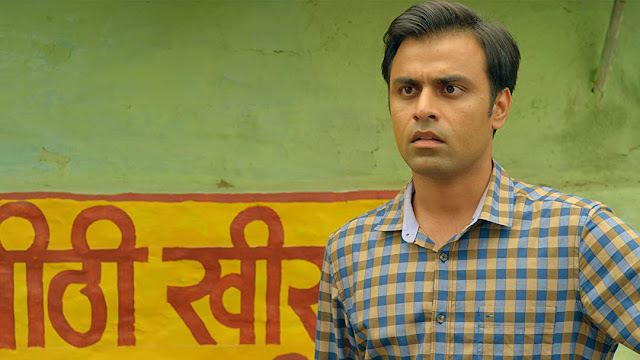Panchayat - Review
This is the BEST Indian show I've ever seen. It's near perfection.
Our protagonist is Abhishek Tripathi (Jitendra Kumar) and he enters a rural town named Phulari. Since he was born and raised in urban society, he's a "fish out of water" character in this town, and that is mainly the source of the comedy in the series, as well as his insecurity for feeling like an outsider.
The scenes with Abhishek and his friend in the urban locations are shot with a sort of blue colour palette giving it a sense of bleakness. And the village we expect to look dirty and dull, is saturated, which is the irony.
Abhishek is the secretary of the Panchayat office in town, and he doesn't like his job. He finds it difficult to adjust to it's functioning and people. He's too "modern" for them. This causes him to be rude to many of it's citizens. He isn't a total "bad person", but he isn't afraid to give people a piece of his mind when needed.
But as each episode progresses, we get to explore each character, as well was the situation of the town and it's people. Topics such as ego and feminism is explored, but isn't preachy in any way.
In episode 3, Abhishek has to stay with a bride, and his friends in the office. When he asks them to wait for two minutes when asked to serve them food, their male ego gets hurt. This causes them to have an affinity towards Abhishek and start to make his job more difficult for him on purpose. But Abhishek takes this. In the end, they manage to test his patience, and he fights back courageously and curses at them to top it all off.
This causes the groom to cry, and he uses his father's influential power to make him pay. Throughout this scene and episode, Abhishek gets a revolving chair, which is the physical embodiment of "modern and progress" which causes the groom, as well as Pradhan (Raghubir Yadav) to feel inferior, as they are termed as "old fashioned."
This was by far, my favourite episode as it uses a simple chair, as a physical manifestation for "power", which I consider to be the theme of this episode. In the end, Abhishek loses the chair, but he doesn't care. To him, it's just a chair, but to others, it's a seat of power and control. It uses a chair to separate the mindsets of Abhishek and the citizens of Phulari, without unnecessary exposition or "on the nose" storytelling narratives.
Even in the later episodes, the character of town of Phulari starts to reveal itself as firstly, Abhishek investigates the people's fear of a haunted tree by cracking it's false source. We get to see the overconfident and egotistical immaturities of the young boys who bully, we get to view the city's flawed justice system, as well as it's sexist traditions.
The final episode can get a bit slightly preachy at times, but for the most part, the actors' brilliant performances convey the message that even women can do the 'so called' "man's task." Speaking of the performances, each and every actor here is a national treasure. They all were perfectly cast, and felt like residents of this town, right down to the dialect as well as the mannerisms. They felt like real people who weren't even acting.
The editing is simple, and unnoticeable, which is why it's great. It doesn't have sudden close ups, or zooms, or many cuts. For the most part, the camera stays still, or gently moves with the characters viewing them from up close to understand their daily routines. The camera trusts it's actors to engage the audience with their captivating performances alone, and that's extremely rare in Indian Cinema.
Even the comedy here works, mainly from the actors, but also from it's masterfully written dialogues that really capture the essence of the locality and it's mundane nature. There aren't any unnecessary scenes or sub plots. Everything shown to us is either servicing plot or character.
Abhishek throughout the series grows. But not in the way we expect him to. He doesn't LOVE the city as the series ends, he says it so himself. But he certainly grows to adapt in it, and that's enough. He gets an understanding of the rural life, and makes friends that are there for him. Not only Abhishek, but even the other characters change, realising their obsolete and unprogressive mindsets. I'm not saying their dumb, I'm saying that the series unapologetically shows how they're fascinated and are still trying to understand the "modern" way of things.
This series isn't the type of most Indian shows that are these "dark and engaging thrillers" where plot twists and gory murders take place. But it's a slow and meditative series that just let's us see these people as they are. Which is why I'm afraid people wouldn't watch it. It tests your patience, and in a great way. It reminds me a lot of Newton, another slow burn of a film, but does it intentionally and is part of it's brilliance.
This is the best show because it has a simple plot, where nothing grand happens. But it's a small scale and well made and acted series that highlights issues in society, and respects our intelligence.
Thank Your for Reading
I hope you liked this blog review, please make sure to comment about your thoughts on the film, or on how I could possibly improve. Also follow my YouTube Channel "Detox with P-Talks Official" where I analyse movies and do other movie related content along with short films, etc.







Very well written blog. If you liked this, you migt also like to read Munshi Premchand and Mark Tully.
ReplyDeleteI just loved this show.
ReplyDeleteIt just shows us that in this world concrete and progress there is a place where people still need a push towards progress which I think is the main motto of this show. It appeals to the people living in the city that they need to go around and understand how still some people "adjust" and are happy in what they have unlike them who keep floundering around for their desires. It appeal to the people living in villages and small towns as well as it shows them how the world outside their village is changing and how they need to change with it.
This show displays that change is difficult and necessary but, not impossible.